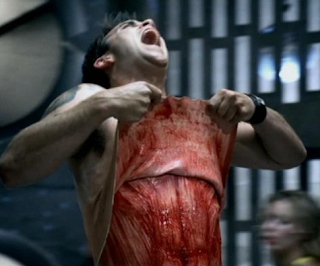I’ve never
been a fan of Robbie Williams. A bit too self-conscious, and constructed. Arch,
even. A bit too…Benny Hill. Although
I have to confess I was quite taken with the story I once heard, of how he asked
to be driven to a pub in the middle of
nowhere after this film shoot, dressed in this
costume. Wandered up to the
bar, ordered a round of drinks, then frantically patted himself down for his
wallet, before running out into the night giggling.
I suppose
as a feminist I should thank him for commodifying himself to the same degree
that so many women performers do; could be he’s a subversive activist, whose
cheeky chappy career has been all about highlighting the disparities between
male and female identities in the spotlight of commercialised sexuality. But, he’s
probably just a dickhead.
So I
wasn’t too disappointed then when I heard his latest song, which is, frankly, rubbish.
Worse: it’s divisive, privileged, ignorant rubbish. Honestly, how dumb and
sheltered is he?
It even
got on the news for being so awful, and a Russian commentator was quoted as
saying that there were, sort of, some recognisably Russian elements to his caricature
of the culture, if you went back to the 1950s. Research, Robbie, research. (Check
out the bit where he sings ‘revolution is in the wind’, as if it’s not 99 years
later.)
My
cringing reaction to Party Like A Russian was thrown into sharp relief for me the following evening when
I went to see the movie 8
Days A Week. Didn’t expect much,
as I’m not a huge Beatles fan (UNLIKE SOME OF THE AUDIENCE OMG), but actually,
what a bloody good film.
In amongst
the 1960s footage it was very touching to hear a present-day Whoopi
Goldberg talk about how much Beatlemania meant to
her, as a child in New York. How inclusive their music seemed, and how for her
it transcended the bitter racial divisions that she was growing up in, and made
her feel part of something that was for black and white alike. And that was
even before the Beatles refused to play to a segregated audience in Jacksonville. Mind you, also before John Lennon’s unfortunate
remarks about Jesus. And before
this. Can’t please everyone.
But
listening to Whoopi in particular, I was reminded of the feeling I had as a
child when I first realised that the story I was reading – the rich, exciting,
adventure book I was enjoying so much – was not written for me. It was written
for boys. Something jarred, and I realised I wasn't the audience the author
had in mind when writing; this voice I loved so much was not speaking to me at
all. I felt betrayed.
It’s a
feeling that’s never left me, because every day there’s a song, or an ad, a
newspaper article or a painting, that reminds me that I’m not the audience. I’m
scenery.
I expect
that’s how any Robbie Williams fans in Russia are feeling right now; whoever he
thinks he’s communicating with, it’s clearly not them.
But then,
maybe he’s only ever been communicating with himself. So to speak.





